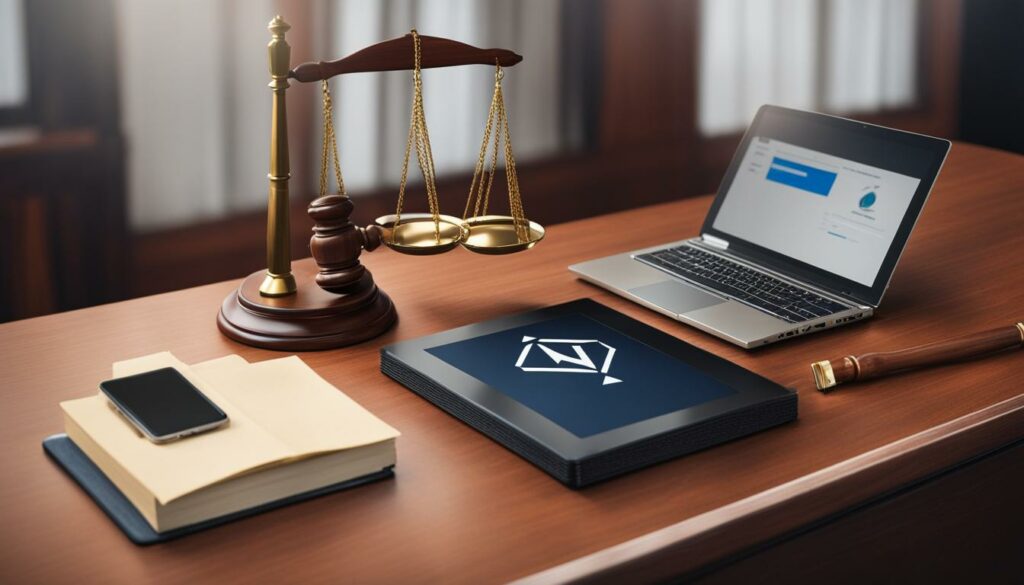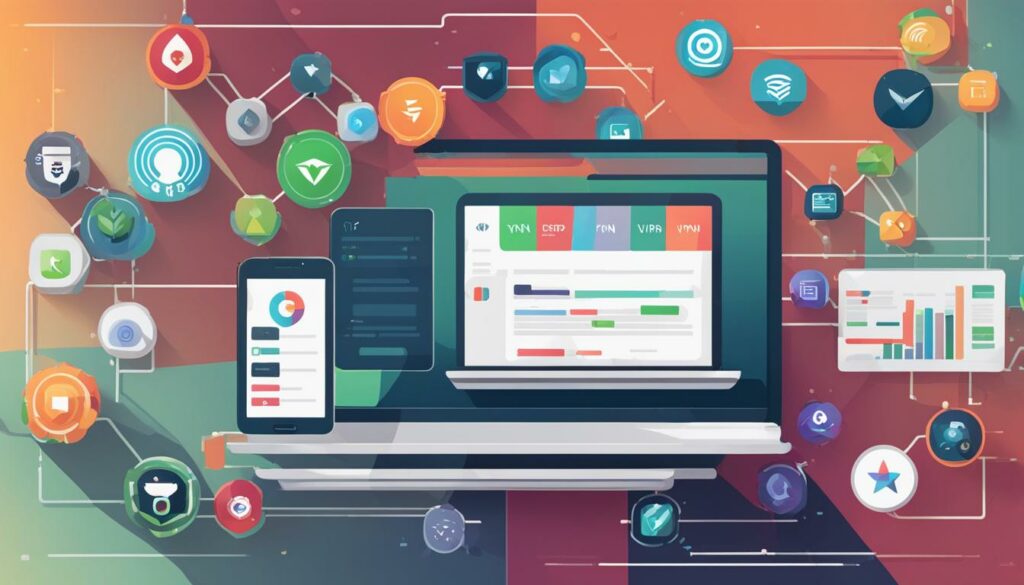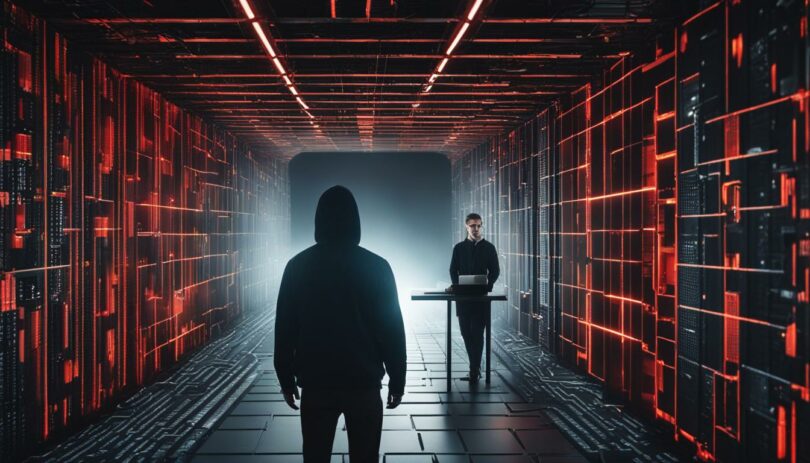A VPN, or Virtual Private Network, is a tool that helps protect your online privacy and enhance your security. It creates a secure network connection by encrypting your data and routing it through private servers. This allows you to browse the internet more securely and privately, hiding your IP address and location data. VPNs have become essential in today’s digital world, providing users with anonymity and protecting their personal information from prying eyes.
Key Takeaways:
- VPN stands for Virtual Private Network.
- A VPN encrypts your data and routes it through private servers for enhanced security and online privacy.
- VPNs hide your IP address and location, providing anonymity while browsing the internet.
- VPNs are essential in protecting personal information from hackers and other third parties.
- Using a reputable VPN provider helps ensure a secure and reliable connection.
VPN Benefits: Enhancing Privacy, Security, and Accessibility
A VPN offers numerous advantages that contribute to a better online experience. By understanding the benefits and uses of a VPN, you can make an informed decision about whether it’s the right tool for you.
1. Enhanced Privacy
One of the primary benefits of using a VPN is the ability to protect your privacy. By encrypting your internet traffic and masking your IP address, a VPN ensures that your online activities remain anonymous and inaccessible to hackers, government surveillance, or internet service providers. This added layer of security makes it difficult for anyone to track, monitor, or collect your personal information.
2. Increased Security
With cyber threats becoming increasingly sophisticated, using a VPN is crucial to safeguarding your data and online presence. By encrypting your internet traffic, a VPN creates a secure connection, preventing unauthorized access and protecting your sensitive information, such as passwords, credit card details, and personal documents. Whether you’re browsing on public Wi-Fi networks or accessing sensitive information remotely, a VPN ensures that your connection remains secure and private.
3. Access to Blocked Content
Another key advantage of using a VPN is the ability to bypass geo-restrictions and access blocked content. By connecting to a VPN server located in a different country, you can mask your IP address and access websites, streaming services, or online platforms that may be restricted in your current location. This allows you to enjoy the full range of online content and services, regardless of your physical location.
In summary, a VPN provides several benefits, including enhanced privacy, increased security, and access to blocked content. By encrypting your internet traffic, hiding your IP address, and offering a secure connection, a VPN ensures that your online activities remain private and protected. Additionally, a VPN allows you to bypass geo-restrictions and access blocked content, providing a more inclusive and unrestricted online experience.
How Does a VPN Work?
A VPN works by establishing a secure connection between your device and the internet. This is done through a process of encryption, server connections, and tunneling protocols. Let’s take a closer look at each of these components:
Encryption:
Encryption is one of the key features of a VPN. When you connect to a VPN, the data you send and receive is encrypted. This means that it is converted into a code that can only be read by the intended recipient. Encryption ensures that your online activities and personal information are protected from unauthorized access.
Server Connection:
A VPN uses a network of private servers located in various locations around the world. When you connect to a VPN, your internet traffic is routed through one of these servers. This server acts as a middleman between your device and the websites or services you are accessing. By connecting to a server in a different location, you can mask your IP address and appear as if you are browsing from a different location.
Tunneling Protocols:
Tunneling protocols are responsible for establishing a secure tunnel between your device and the VPN server. These protocols ensure that your data is protected from interception or tampering. Some common tunneling protocols used by VPNs include OpenVPN, IKEv2, and L2TP/IPsec.
In summary, a VPN works by encrypting your data, routing it through private servers, and establishing a secure connection. This allows you to browse the internet more privately and securely, protecting your personal information from potential threats.
| Key Components | Description |
|---|---|
| Encryption | Converts data into a code to protect it from unauthorized access |
| Server Connection | Routes internet traffic through private servers to mask your IP address |
| Tunneling Protocols | Establishes a secure tunnel between your device and the VPN server |
Different Types of VPN Users

When it comes to VPN users, there are two primary categories: organizational users and personal users. Each category has its own specific needs and requirements.
Organizational VPN Users
Organizational VPN users include companies, schools, and online communities that need to create a secure network for their employees or members. These VPNs are often used to share confidential information, protect sensitive data, and ensure secure communication among employees or members. Organizational VPNs allow for centralized management, making it easier to enforce security policies and reduce vulnerabilities.
Personal VPN Users
Personal VPN users are individuals who want to protect their online activities and enhance their privacy. Personal VPNs are particularly useful when traveling or using public Wi-Fi networks, as they encrypt internet traffic and hide IP addresses. By using a personal VPN, individuals can browse the internet anonymously, access geo-restricted content, and protect their personal information from potential threats.
Table: Comparison of Organizational and Personal VPN Users
| Organizational VPN | Personal VPN | |
|---|---|---|
| Target Users | Companies, schools, online communities | Individuals |
| Purpose | Securing internal networks, sharing confidential information | Protecting online activities, enhancing privacy |
| Management | Centrally managed by IT department | User-managed |
| Security | Enforced security policies, reduced vulnerabilities | Encrypted internet traffic, hidden IP address |
How to Choose the Right VPN
When it comes to selecting a VPN, there are several critical factors to consider. Making the right choice is essential to ensure that you get the most out of your VPN experience. Here are some key criteria to keep in mind:
1. Privacy and Security Features
One of the primary reasons for using a VPN is to enhance your online security and protect your privacy. Look for VPN providers that have robust encryption protocols, such as AES 256-bit encryption, which is considered the industry standard. Additionally, check if the VPN service has a strict no-logs policy, meaning they do not store any data about your online activities.
2. Server Locations and Geographical Distribution
The more server locations a VPN provider offers, the better the chance of accessing geo-restricted content and enjoying a faster and more reliable connection. Before choosing a VPN, check where their servers are located and ensure they have a presence in the countries or regions you are interested in.
3. Connection Speed and Bandwidth
A VPN should not significantly slow down your internet connection. Look for VPN providers that offer high-speed connections and unlimited bandwidth. Some VPN services throttle the connection speed once you reach a certain data limit, so be sure to read user reviews and check for any limitations before making your decision.
4. User-Friendly Interface and Compatibility
Ensure that the VPN app or software is user-friendly and compatible with your devices and operating systems. Look for providers that offer apps for a wide range of platforms, including Windows, macOS, Android, and iOS. Additionally, check if the VPN supports simultaneous connections on multiple devices, allowing you to protect all your devices with a single subscription.
5. Customer Support
Good customer support is crucial when it comes to VPNs. In case you encounter any issues or have questions, you want to ensure prompt and helpful assistance. Look for VPN providers that offer 24/7 customer support, preferably through multiple channels, such as live chat, email, or phone.
6. Pricing and Payment Options
Consider the cost of the VPN service and compare it with the features and benefits they offer. While a free VPN may seem tempting, they often come with limitations and may compromise your privacy. Choose a VPN provider that offers flexible payment options and competitive pricing based on your needs.
| Criteria | Importance | Your Score |
|---|---|---|
| Privacy and Security Features | High | |
| Server Locations and Geographical Distribution | High | |
| Connection Speed and Bandwidth | Medium | |
| User-Friendly Interface and Compatibility | Medium | |
| Customer Support | Medium | |
| Pricing and Payment Options | Low |
Choosing the right VPN requires careful consideration of these criteria. Assess the importance of each factor based on your specific needs and preferences. It’s also helpful to read reviews, compare different VPN providers, and take advantage of any free trial offers to test the service before committing to a subscription.
Online Security Best Practices

Ensuring your online security is essential in today’s digital landscape. By following these best practices, you can protect your personal information and reduce the risk of falling victim to cyber threats.
Create Strong and Unique Passwords
One of the most important steps you can take to enhance your online security is to create strong and unique passwords for your accounts. Avoid using easily guessable passwords such as your name or birthdate. Instead, use a combination of uppercase and lowercase letters, numbers, and special characters. Additionally, it is crucial to use different passwords for each of your accounts to prevent hackers from gaining access to multiple accounts if one password is compromised.
Be Wary of Phishing Attacks
Phishing attacks are a common method used by cybercriminals to trick individuals into revealing sensitive information. Be cautious of unsolicited emails, messages, or phone calls that ask for personal information or contain suspicious links. Avoid clicking on these links or providing any personal details unless you can verify the legitimacy of the sender. Remember that legitimate organizations will never ask for sensitive information via email or other insecure channels.
Maintain Strong Antivirus Software
Having strong and up-to-date antivirus software installed on your devices is essential for protecting against malware, viruses, and other online threats. Regularly update your antivirus software to ensure it is equipped to detect the latest threats. Additionally, perform regular scans of your devices to identify and remove any potential threats that may have been inadvertently downloaded.
Regularly Back Up Your Files
Backing up your important files is crucial in the event of a data breach or device failure. Regularly save copies of your files to an external storage device or a cloud-based backup service. This ensures that even if your device is compromised, you will still have access to your important data.
Enable Two-Factor Authentication
Two-factor authentication adds an extra layer of security to your online accounts by requiring an additional verification step, such as a unique code sent to your phone, in addition to your password. Enable two-factor authentication whenever possible to protect your accounts from unauthorized access.
Exercise Caution When Sharing Personal Information
Be cautious about sharing personal information online, especially on social media platforms. Limit the amount of personal information you make publicly available and adjust your privacy settings to ensure only trusted individuals can access your personal information. This helps reduce the risk of identity theft and other forms of online fraud.
Frequently Asked Questions About VPN
As VPN usage becomes increasingly popular, many people have questions about how VPNs work and their benefits. In this section, we will address some of the frequently asked questions about VPNs.
What is a VPN and why do I need it?
A VPN, or Virtual Private Network, is a tool that creates a secure and encrypted connection between your device and the internet. It helps protect your online privacy and security by masking your IP address and encrypting your internet traffic. You need a VPN to browse the internet anonymously, access geo-restricted content, and protect your personal information from hackers and other third parties.
Do I need a VPN on my phone?
Yes, using a VPN on your phone is highly recommended. Your mobile device holds a vast amount of personal information, and connecting to public Wi-Fi networks can pose significant risks. A VPN encrypts your internet traffic, securing your data and protecting your privacy when using your phone or other mobile devices.
Should VPN be on or off?
It is generally recommended to keep your VPN turned on whenever you are connected to the internet. This ensures that your internet traffic is always encrypted and secure, protecting your data from potential threats. However, there may be certain situations where you may choose to turn off your VPN, such as when accessing specific local services or websites that require your actual IP address.
Is it OK to leave VPN on all the time?
Leaving your VPN on all the time is generally safe and recommended for maximum security and privacy. By keeping your VPN active, you ensure that all of your internet traffic is protected, even when you are using public Wi-Fi networks or accessing the internet from different locations. However, if you experience any performance issues or if you need to access local services that are restricted when connected to a VPN, you may choose to turn it off temporarily.
When shouldn’t I use a VPN?
While VPNs offer numerous benefits, there are certain situations where using a VPN may not be necessary or suitable. For example, if you are using a trusted and secure internet connection at home or in the office, you may not need to use a VPN. Additionally, some online services or websites may block access when connected to a VPN. In such cases, it may be more convenient to temporarily disable your VPN.
Does a VPN drain battery?
Using a VPN may have a slight impact on your device’s battery life. The VPN app running in the background and encrypting your internet traffic requires some processing power, which can result in slightly increased power consumption. However, the impact on battery life is generally minimal and should not be a significant concern for most users.
By addressing these frequently asked questions, we hope to provide you with a better understanding of VPNs and help you make informed decisions about using them to enhance your online privacy and security.
Is a VPN Legal?

VPN legality varies from country to country. In most countries, including the United States, using a VPN is legal and there are no restrictions on its usage. However, there are a few countries that regulate or even ban the use of VPNs. China, Iran, and Russia, for example, have strict regulations on VPN usage and may heavily monitor or restrict access to VPN services.
It’s important to be aware of the laws and regulations regarding VPN usage in your country. Before using a VPN, make sure to research and understand the legal implications in your jurisdiction. This will help ensure that you are in compliance with the local laws and can use a VPN safely and legally.
“Understanding the legal landscape regarding VPN usage is crucial to ensure a secure and legal online experience.”
VPN Laws Around the World
Here is a brief overview of VPN laws in some countries:
| Country | VPN Legal Status |
|---|---|
| United States | Legal |
| United Kingdom | Legal |
| Canada | Legal |
| Germany | Legal |
| China | Regulated/Banned |
| Russia | Regulated/Banned |
| Iran | Regulated/Banned |
These are just a few examples, and the legal status of VPNs can change over time. Always stay informed about the latest laws and regulations to ensure a safe and legal online experience.
The Difference Between VPN and Proxy
When it comes to protecting your online privacy and security, two common tools that often come up in discussions are VPNs and proxies. While both can help you maintain anonymity and bypass certain restrictions, there are some key differences between them that are worth exploring.
A VPN, or Virtual Private Network, works by encrypting your internet traffic and routing it through a secure server. This not only hides your IP address but also ensures that your data remains private and secure. In contrast, a proxy server acts as an intermediary between your device and the internet. It receives your requests and forwards them to the destination website, masking your IP address in the process.
One of the main advantages of using a VPN is its ability to provide end-to-end encryption, ensuring that your data is protected from prying eyes. A proxy, on the other hand, may not offer the same level of encryption, leaving your data vulnerable to interception. Additionally, VPNs typically provide a wider range of server locations, allowing you to access content from different regions. Proxies, on the other hand, may have limited server options.
In summary, while both VPNs and proxies can help protect your privacy and allow you to access restricted content, VPNs offer a more comprehensive solution with stronger encryption and a wider range of server options. Ultimately, the choice between the two will depend on your specific needs and requirements.
Key Differences Between VPNs and Proxies
| VPN | Proxy |
|---|---|
| Provides end-to-end encryption | May not offer the same level of encryption |
| Offers a wider range of server locations | May have limited server options |
| Can protect your data from interception | Data may be more vulnerable to interception |
VPN Apps vs VPN Extensions

When it comes to using a VPN, there are two main options available: VPN apps and VPN extensions. While both offer some level of protection, there are significant differences between the two in terms of functionality and security.
A VPN app is a standalone application that you install on your device. Once installed, the app encrypts all internet traffic on your device, ensuring that all data sent and received through your internet connection is secure. VPN apps provide comprehensive protection for all online activities, including browsing, streaming, and downloading.
On the other hand, VPN extensions are browser-specific and only protect your internet traffic within a specific browser. These extensions are typically lightweight and easy to install, but they only protect your browsing activity within the browser where the extension is installed. They do not provide encryption for other internet-connected applications or devices on your system.
While VPN extensions can be convenient for users who primarily use a specific browser for their online activities, VPN apps offer more comprehensive protection and security. With a VPN app, you can ensure that all your internet traffic is encrypted, regardless of the browser or application you are using. This is particularly important when using multiple internet-connected applications or devices.
| VPN Apps | VPN Extensions |
|---|---|
| Offers encryption for all internet traffic on your device | Only encrypts internet traffic within a specific browser |
| Provides comprehensive protection for browsing, streaming, and downloading | Only protects browsing activity in the installed browser |
| Works across all internet-connected applications and devices on your system | Limited to the browser where the extension is installed |
Overall, it is recommended to use a VPN app for maximum protection, especially if you use multiple browsers or internet-connected applications. VPN apps offer stronger encryption and security features, ensuring that all your online activities are secure and private. However, if you primarily use a specific browser for your internet activities, a VPN extension can provide a lightweight and convenient option.
How to Start Using a VPN
Getting started with a VPN is a simple process that typically involves downloading and installing the VPN app on your device, creating an account, and connecting to a VPN server. Here are the steps to set up and start using a VPN:
- Choose a reputable VPN provider: Research and select a VPN provider that fits your needs in terms of features, security, and user interface.
- Download and install the VPN app: Visit the VPN provider’s website or app store to download the VPN app compatible with your device’s operating system.
- Create an account: Follow the instructions provided by the VPN app to create a new account. This usually involves providing an email address and setting a password.
- Log in to the VPN app: After creating an account, log in to the VPN app using your credentials.
- Select a VPN server: The VPN app will present you with a list of server locations to choose from. Select a server based on your desired location or specific needs, such as bypassing geo-restrictions.
- Connect to the VPN server: Once you have chosen a server, click on the connect button in the VPN app to establish a secure connection.
After connecting to the VPN server, your internet traffic will be encrypted and routed through the VPN, providing you with enhanced privacy and security. Remember to keep the VPN app running in the background for continued protection while browsing the internet.
“Setting up a VPN is a crucial step in securing your online activities. By encrypting your data and masking your IP address, a VPN ensures that your online activity remains private and protected from prying eyes.” – Cybersecurity Expert
Using a VPN is an effective way to safeguard your online privacy and protect your sensitive information from cyber threats. By following the steps mentioned above, you can start using a VPN and take control of your online security.
Table: Comparison of Popular VPN Setup Processes
| VPN Provider | Download Process | Account Creation | Server Selection | Connection |
|---|---|---|---|---|
| Provider A | Simple download from website | Email and password | List of server locations | One-click connection |
| Provider B | App store download | Username and password | Interactive map | Single-tap connection |
| Provider C | Website download with installation wizard | Email verification and password | Advanced server filtering options | Manual connection with protocol selection |
Table: Comparison of popular VPN setup processes. Note that the actual setup process may vary depending on the VPN provider and their specific software.
VPN Usage and Privacy Tips
When it comes to using a VPN, there are several important tips and best practices to keep in mind in order to maximize your privacy and security online. By following these guidelines, you can ensure that your data remains protected and your online activities are kept private.
1. Choose a reputable VPN provider
First and foremost, it is crucial to select a trustworthy VPN provider. Look for providers that have a strong track record of protecting user privacy and have implemented robust encryption protocols. Avoid free VPN services, as they often come with limitations and may compromise your privacy by selling your data to third parties.
2. Enable the kill switch feature
Most reputable VPN providers offer a kill switch feature, which automatically disconnects your internet connection if the VPN connection drops. This prevents your data from being exposed to your ISP or other potential observers. Be sure to enable this feature in the VPN settings to maintain a secure connection at all times.
3. Use strong, unique passwords
Protecting your VPN account with a strong, unique password is essential. Avoid using common or easily guessable passwords, and consider using a password manager to generate and store complex passwords securely. This will help prevent unauthorized access to your VPN account and ensure the privacy of your online activities.
4. Be mindful of your online activities
While a VPN can provide an additional layer of privacy and security, it’s important to remember that it does not guarantee complete anonymity. Be cautious of the information you share online and avoid engaging in activities that may compromise your privacy, such as downloading copyrighted content or participating in illegal activities.
By following these VPN usage and privacy tips, you can enjoy a safer and more private online experience. Remember that your online security is a shared responsibility, and staying informed and proactive is key to protecting your personal data.
The Future of VPN Technology

In today’s ever-evolving digital landscape, the future of VPN technology is shaping up to be quite promising. Technological advancements and innovations are continuously driving the development of VPN services, aiming to meet the growing needs of online privacy and security.
One area of focus for the future of VPN technology is enhanced encryption protocols. VPN providers are exploring more robust encryption algorithms and methods to ensure that user data remains secure and protected from potential threats. This includes the implementation of advanced encryption standards and protocols, such as AES-256, which offer a higher level of security.
“The future of VPN technology lies in the integration of emerging technologies like blockchain. Decentralized VPN networks can potentially revolutionize how VPNs operate, providing even greater privacy and security to users.”
Another significant aspect of the future of VPN technology is the potential integration of emerging technologies like blockchain. Decentralized VPN networks can potentially revolutionize how VPNs operate, providing even greater privacy and security to users. By leveraging blockchain technology, VPN services can create a distributed network of peer-to-peer connections, eliminating the need for centralized servers and enhancing user anonymity.
Furthermore, the future of VPN technology is likely to see advancements in user interfaces and overall usability. VPN providers are constantly striving to enhance the user experience, making VPN apps more intuitive and user-friendly. This includes simplified setup processes, streamlined connectivity options, and improved performance to ensure seamless and effortless VPN usage.
In conclusion, the future of VPN technology looks promising. Continuous advancements in encryption protocols, the integration of emerging technologies like blockchain, and improvements in user interfaces will drive the evolution of VPN services. As the digital landscape evolves, VPNs will continue to play a crucial role in safeguarding online privacy and security.
Conclusion
In conclusion, a VPN, or Virtual Private Network, is a crucial tool for enhancing online privacy and security. By encrypting your internet traffic and masking your IP address, a VPN protects your data from hackers and other third parties. It allows you to browse the internet anonymously, access geo-restricted content, and safeguard your personal information.
A VPN creates a secure network connection by routing your data through private servers, ensuring that your online activity remains private and secure. It provides increased privacy, enhanced security, and the ability to browse the internet freely and anonymously. Whether you are an individual user or part of an organization, a VPN is essential in today’s digital world.
When choosing a VPN, it’s important to consider factors such as the provider’s no-logs policy, geographical distribution of servers, speed, security features, and price. By selecting a reputable VPN provider and following online security best practices, such as setting strong passwords and being cautious about sharing personal information, you can maximize the benefits of using a VPN.
As the field of VPN technology continues to evolve, advancements in encryption protocols and server networks are being made to enhance performance and usability. The future may also see the emergence of technologies like blockchain and decentralized VPN networks, offering even greater privacy and security. In the ever-changing digital landscape, a VPN remains an indispensable tool for protecting your online privacy and safeguarding your personal data.
FAQ
What is a VPN and why do I need it?
A VPN, or Virtual Private Network, is a tool that helps protect your online privacy and enhance your security. It creates a secure network connection by encrypting your data and routing it through private servers. VPNs are essential in today’s digital world, providing anonymity and protecting personal information from prying eyes.
Do I need a VPN on my phone?
Yes, using a VPN on your phone is beneficial for protecting your online activities and enhancing your privacy. It encrypts your internet traffic and hides your IP address, ensuring a secure connection when using public Wi-Fi networks or browsing the internet.
Should VPN be on or off?
It is recommended to keep your VPN turned on whenever you are connected to the internet. This ensures that your online activities are protected and encrypted, providing an additional layer of security.
Is it OK to leave VPN on all the time?
Yes, it is generally safe to leave your VPN on all the time. This allows for continuous protection of your online activities and ensures a secure connection, especially when using public Wi-Fi networks or accessing geo-restricted content.
When shouldn’t I use a VPN?
There may be certain situations where using a VPN is not necessary or recommended. For example, if you are accessing local network resources or websites that block VPN connections, it might be best to temporarily disable your VPN.
Does a VPN drain battery?
Using a VPN may have a slight impact on your device’s battery life. However, this impact is usually minimal, and the added security and privacy benefits outweigh any minor battery consumption.






